Anong konek? (What's the connection?) The gaps between personal experience, science, and climate action
A Filipino copywriter and environmental advocate's attempt to make sense of why it doesn't quite make sense for others
As I draft this piece, a good part of my country, the Philippines, is being ravaged by Severe Tropical Storm Crising (international name Wipha) and the southwest monsoon (known locally as habagat). I’m worrying about whether the lights will stay on and if the basin downstairs can catch all the water dripping from a part of our ceiling.
But I’m already in so much comfort and luxury compared to others. I work from home, I have food and water, electricity and internet. I have a GO BAG and funds.
The climate disaster experience
In some parts of my city, there’s head-deep floodwater. A colleague had to file an emergency leave because their internet went out, and the floods are preventing him from working elsewhere. My fiancé lives in a city that’s often ravaged by floods, to the point where bringing their appliances up to the second floor has become routine. Elsewhere in the country, dams are overflowing or have had to release water. There were freak accidents involving boulders or posts falling over and harming lives or property.
And some will say well, it’s rainy season. It is what it is.
Others will mention the government’s subpar flood control projects and how infrastructure is often linked to corruption.
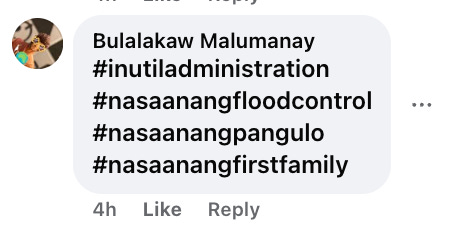
It’s not often that I see people directly connecting these natural disasters with how humans are destroying nature…and what we can do about it.
The Science
But maybe there’s hope! Aleast, in recent years, I’ve started seeing “memes” like these:
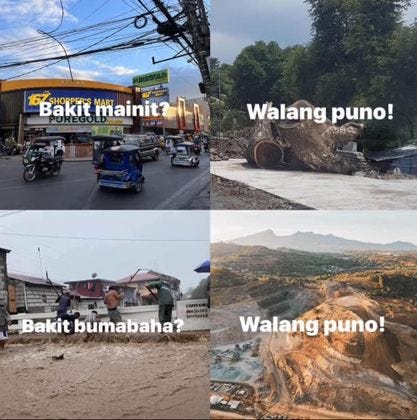
In recent months, I’ve also started seeing posts like these:
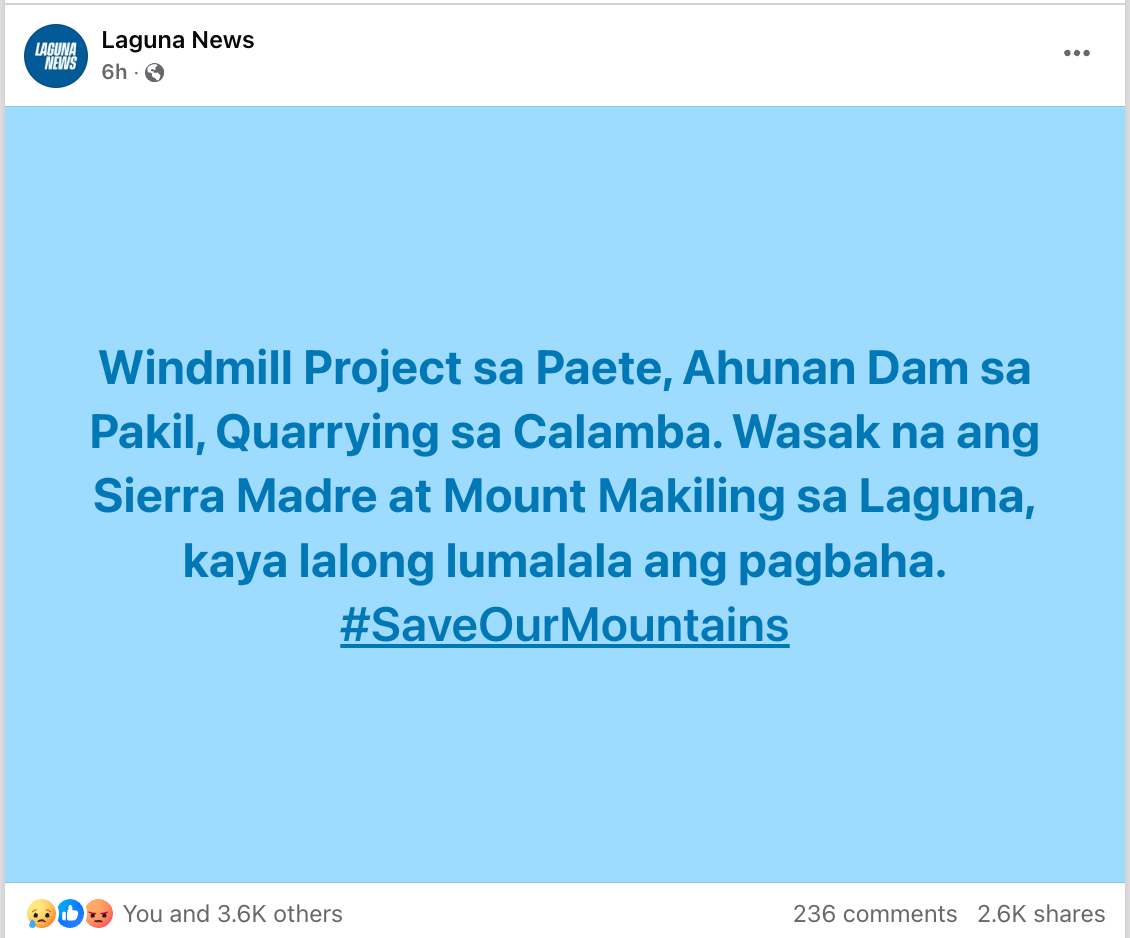
And…sensible comments threads like this one1:
But what I tend to observe, at least from my little algorithm-shaped corner, is that these conversations often happen only during natural disasters. Heat waves and water shortages in the summer. Typhoons later in the year. Then…barely anything.
I think that there’s still a disconnect between the environmental destruction that we see and the effects that each of us has to face.
People see the prices of food go up, but do they know that their precious coffee and matcha are affected by climate change?
They hear about deforestation, mining, and reclamation, but do they get that the politicians they voted for allowed those things to happen, and that these choices resulted in devastation and their personal experiences of flood, health hazards, and more?
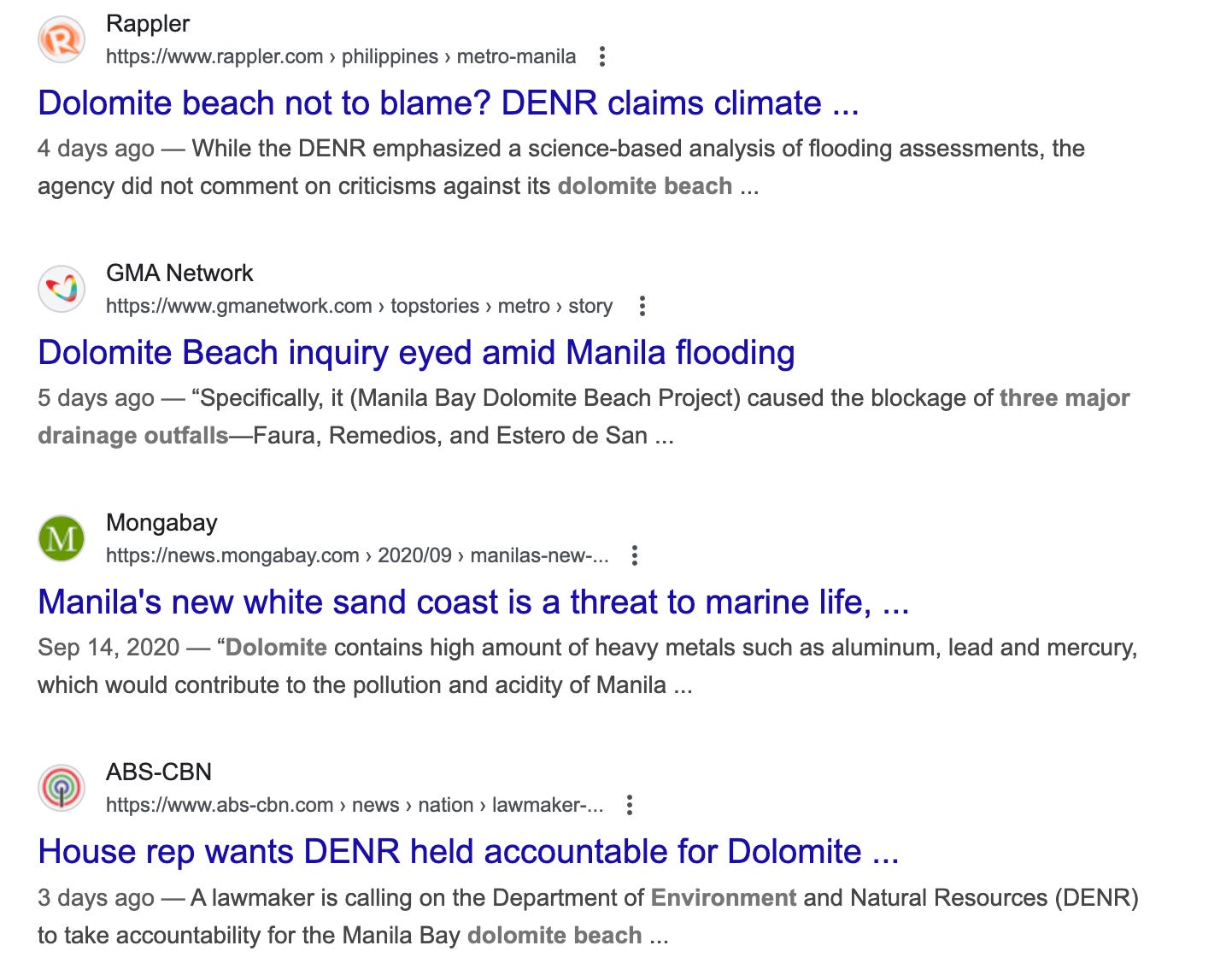
Some will say, “Well, it’s out of my hands. The billionaires and governments should work on that,” but what if it’s you putting money in the pockets of billionaires, you who cast your vote, you who can demand change?
Some can see the connection. But others still haven’t. And they can’t, unless it’s staring them in face and it’s probably too late.
Climate action and creative communication
As someone who works as a communicator and who tries to do my bit as an advocate, I genuinely do want to help out. I’m just not quite sure how? Haha.
I mean, I did a lot of talking to my immediate family and relatives over the past few years to try to explain why I bring my own utensils or don’t buy disposable pads anymore. My fiancé supports me however he can, including helping me drop off plastics to be recycled by The Plaf2. Some friends and colleagues have come to know me as an advocate, though no one really comments on it.
I signal-boost environment-related posts and hashtags not only to my own profile, but to groups outside my echo chamber.
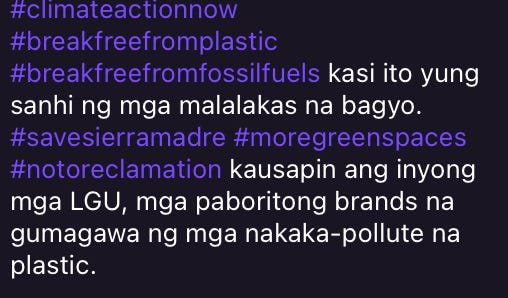
But what I wish I could help out with is the sort of science communication/copywriting that can inspire people to act. Of course, it starts with awareness efforts similar to this study about Typhoon Yolanda and jargon like “storm surge”:
As communicators, we could work with those in the academe to help laymanize the science behind microplastics, make quick action points on how to hold brands or the government accountable. That sort of thing.
We could use our content strategy skills to find out why these posts got more likes for Greenpeace PH…
…while posts like this one got less engagement:
Maybe there’s a way to use the principles of marketing and advertising against rampant consumerism and instead use it to inspire a call to climate action?
We’d start by studying the target market. Diving deep into their goals, pain points, and gain points, like their hopes for their children’s future or worries about food security while on minimum wage.
Then, we’d study the “competition” such as sachet culture or indiscriminate gen AI use.
Our calls to action could include learning more through in-depth material, or the usual “sign the petition”, “like and share”.
Visuals and metaphors have been shown to help communicate complex concepts, while impactful and relatable copy can get the audience hooked. Peso Weekly is good at this:
This post by Youth Advocates for Climate Action PH uses a trendy meme, but the abbreviations and long caption could have been refined. Maybe a carousel post instead?
Long-form content like academic papers and podcasts could be repurposed into short-form content for those who don’t have a lot of time to listen in.
And info-heavy content (ads) like these could be supplemented by video-based ads on platforms like TikTok.
People are connecting with these materials, I think. Or is the ad just getting served to me because Meta knows I’m an advocate? The comments do show some promise, though.
Hopefully, these opportunities to communicate would also come with checks and balances. We must be vigilant against greenwashing, especially from brands that’ve perfected a “green” image but aren’t transparent about their sourcing, materials, or processes, and lack third-party verification for their claims.
Imagine what a bunch of communicators, creatives, climate scientists, farmers, fisherfolk, indigenous peoples, and environmental advocates could do together!
We could help people see that unmistakable connection. Compel them to act! And maybe we could try to save this planet.
What now?
By now you’re probably asking: what can I do as an individual? Here are some suggestions:
Continue learning, however you can. Follow accounts like Greenpeace PH, Youth Advocates for Climate Action PH, Break Free from Plastic, Masungi Georeserve, and Protect Verde Island Passage. Join groups like Buhay Zero-Waste on Facebook. Engage with posts related to climate action, so the algorithm knows to serve you more of that content.
Be gentle with yourself, but set the bar a little higher each time. There is no use trying to “perfect” zero-waste. Just do what you can, and do a little better day by day, month by month, year by year. Maybe today it’s just remembering to bring your ecobag and skipping the plastic cutlery. Maybe next month it’s buying from Carousell or FB Marketplace instead of brand-new everything, or supporting brands like Candid Clothing which use deadstock fabric and sew everything locally. And maybe next year it’s switching to a safety razor, so you just need to refill the blades, or practicing meatless Mondays.
Find opportunities to show up for the cause. Sign a petition, share a post, talk to your sphere of influence, join an org, come up with a project with like-minded people.
Understand that this is not supposed to be a burden, but rather an investment in your future and your family’s future. I used to get feelings of “Why am I even doing this…we’ll die of famine or floods anyway…” or “What’s the point?”, but seriously, the action helps me feel less anxious.
Hold corporations and governments accountable. We choose to support brands and brands of leadership. And as someone working in advertising I know that brands do care what their consumers think…because it matters to their bottomline. So I do Lazada product reviews commenting on how I wish they’d use compostable (not oxodegradable) packaging for everything. I tag brands in posts about unnecessary packaging or cutlery, or who practice greenwashing. I do my best to avoid products made by top polluters like Coca-Cola and Unilever. It’s not perfect, but at least it’s less money in their pockets and it’s a conversation starter for others. Lastly, as voters/constituents, we should feel alright calling out public leaders who support the destruction of natural resources or who aren’t fulfilling their mandate.
Let me know if you have questions or insights related to this post! I look forward to learning from your experiences and insights, too.
That said, while I am an environmental advocate, I think there should be nuance when planning these renewable energy projects. Please don’t harm the trees, the indigenous peoples, etc., in the name of being #sustainable.
Yes, I know recycling plastic is but a band-aid solution. But given the limited options here in the Philippines, this is the one I’ve found the most feasible due to my location and limited means.



















You remind me of Ted Failon's realization after Yolanda struck Tacloban: that describing the possibility of a "storm surge" most likely flew over the heads of the residents, who ended up being complacent until the sea swallowed up the city, as storm surges do.
I realize that a lot of how we connect extreme weather to climate change, and climate change to decisions made across the supply chain, tends to either be too technical to be understood, or too much about putting the blame on the corporations (leading to feelings of hopelessness) or on consumers and how they purchase things (leading to resentment). Change is incremental, but in a country where extreme weather affects us disproportionately, well...
I wouldn't call myself an advocate, more so an activist, although I have done a fair bit of writing (targeted to businesses) about more sustainable production. If there's one thing I learned, it's that consumers really do have to be empowered to move the needle—and that means providing them with both the information they need to make informed decisions, and the infrastructure they need to turn decisions into actions. I remember Coca-Cola (sorry, haha) and their bottle recycling program—and how my awareness of that, and most importantly the presence of a recycling point near my flat, empowered me to do my part. And then that recycling point disappeared, and my habits shifted, too.
If consumers, say, are able to really understand the benefits of, say, shifting away from the sachet economy and pursuing more sustainable ways of buying their favorite shampoo or dishwashing liquid, and are empowered to do so in a sustained manner, then the corporations will listen. But I feel this requires a similarly sustained effort to communicate it to them—and not just from environmental activists who, for better or worse, sound like they're speaking from on high, judging everyone below them as *the* problem, rather than the solution.